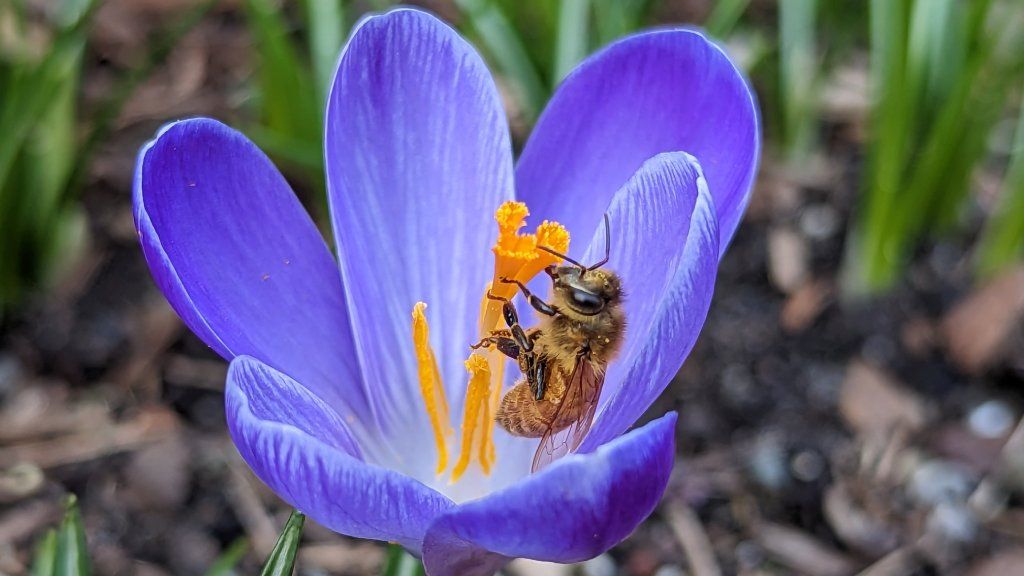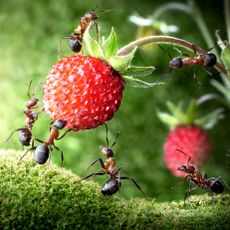When To Clean Up Garden Beds In Spring To Protect Pollinators
Every spring, I'm reminded that many species of insects have used my garden as a winter hotel and may not be ready for a wake-up call just yet.


Spring is the season of new beginnings and heralds the wonder and delights of the garden’s rebirth. But everyone’s heard of spring cleaning – and that usually comes before the pleasure - both inside the house and out back in the garden. I’m often wondering when I should clean my garden in the spring. The housecleaning you can start at any time, but when to start spring garden clean up? You’ll have to be more organized than spontaneous about timing if you want to do right by butterflies.
Spring Clean Up and Insects
As winter melts into spring, the rhythm of the garden starts ticking up again, and a gardener’s thoughts turn to the heavy workload ahead. It’s tempting to jump in as early as possible in spring. But that may not be the best idea.
If you are considering when to clean garden beds in spring, think of the insects overwintering there. Insects use the plants in your garden in amazing ways during winter, some burrowing down in the soil to overwinter, others – in larvae or egg stage – use garden plants as hosts.
Given all these potential forms of life taking shelter in the garden, it’s easy to understand how alarming early spring cleaning might be to them. A wise gardener will take care to accommodate these winter garden dwellers.
When Should I Clean My Garden in Spring?
When to spring-clean a garden is an important issue. It’s in a gardener’s interest to get the work started, but you don’t want to do that at the expense of pollinators or other beneficial insects. You want butterflies, bees, ladybugs and other garden helpers to make it through the winter – and some could be spending the cold months in your garden soil.
Since you can’t know what beneficial insects are overwintering where, experts advise that you hold off from spring cleanup until temperatures are consistently above 50 degrees F (10 C) overnight. This gives beneficial insects a reasonable chance to move out or move on before their winter habitat is destroyed.
Benefits of Waiting
What does holding off do? As the temperature warms at night, insect eggs will hatch and larvae that overwintered in standing weeds stems will emerge. Butterflies and moths – like swallowtails, fritillaries and the luna moth - often overwinter in chrysalises that look like plant parts, hidden among the leaf litter, appear and fly away as temperatures rise. In addition to protecting butterflies, a later start to spring cleaning also allows species of native ground-nesting bees to emerge from the soil.
In many ways, the best course for these insects is for you to skip spring cleaning altogether. But when that’s not an alternative, push it as late as possible and don’t do the kinds of tasks that are likely to kill soil-dwelling larvae or bugs. For example, avoid adding a fresh layer of mulch in spring and if you wish to trim the standing dead stems in the garden, just cut them back rather than taking them out. The hollow stems of dead standing stems in the garden can be used by nesting bees.
Gardening tips, videos, info and more delivered right to your inbox!
Sign up for the Gardening Know How newsletter today and receive a free copy of our e-book "How to Grow Delicious Tomatoes".

Teo Spengler is a master gardener and a docent at the San Francisco Botanical Garden, where she hosts public tours. She has studied horticulture and written about nature, trees, plants, and gardening for more than two decades. Her extended family includes some 30 houseplants and hundreds of outdoor plants, including 250 trees, which are her main passion. Spengler currently splits her life between San Francisco and the French Basque Country, though she was raised in Alaska, giving her experience of gardening in a range of climates.
-
 Why Are My Seedlings Wilting? 6 Common Causes – And How To Save Them
Why Are My Seedlings Wilting? 6 Common Causes – And How To Save ThemWilted seedlings are a definite sign that something is not right. Learn how to diagnose the problem and bring baby plants back from the brink.
By Teo Spengler
-
 Bugged About Strawberry Pests? 6 Common Pests, Plus How To Protect Your Precious Strawbs
Bugged About Strawberry Pests? 6 Common Pests, Plus How To Protect Your Precious StrawbsStrawberry plants looking a little under the weather and not sure why? Check to make sure they haven’t come a-cropper to one of these classic strawberry pests
By Tonya Barnett